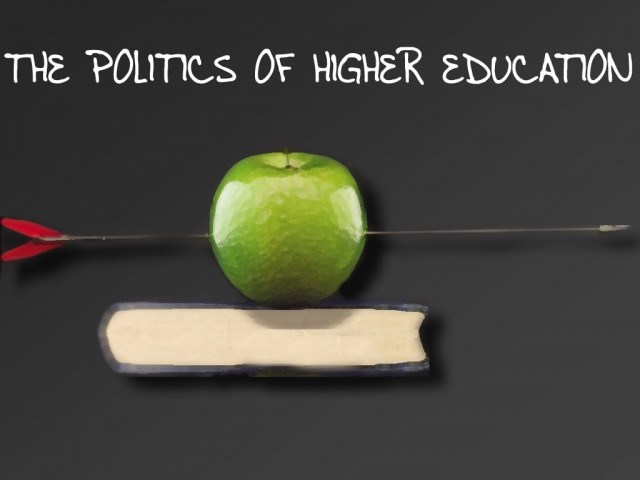10 years of HEC: A revolution in education or misplaced priorities?
The Higher Education Commission’s performance gets mixed reviews from academics.

10 years of HEC: A revolution in education or misplaced priorities?
Since 2002, when the Higher Education Commission (HEC) was formed, there has been a marked surge in the number of higher education institutions and enrollment in Pakistan. There has also been higher focus on research and particularly the soaring number of PhD graduates – a subject of great controversy among academics in and outside of the country.
The HEC was formed to uplift the status of higher education in the country with its founding chairman and former federal minister for science and technology, Dr Attaur Rahman, pushing for high development budgets. In the course of his tenure, Dr Rahman says, more than 14,000 scholarships were granted annually out of which 5,000 were foreign scholarships. “These young scholars are now making a change in the social and economic landscape of Pakistan where a transition to knowledge economy is vital,” he claims.
The number of higher education institutions, including public and private universities, and degree awarding institutions increased from 74 in 2001 to 143 in 2012. Student enrollment in universities also rose drastically from almost 276,000 in 2001-2002 to more than a million in 2011. And in 2008, five Pakistani universities – NUST, UET, Karachi University, Quaid-e-Azam University and Mehran Engineering University – ranked amongst the top universities of the world.
“There is no doubt that the overall performance of HEC has been quite impressive considering the sharp increase in the number of universities, PhDs and scholarships for students and qualified faculty,” said Dr Rasool Baksh Raisani, vice chancellor of the University of Balochistan. However, his university that runs on limited resources and in a tough security climate has almost 200 vacant faculty positions. More than 90% of the 6,000 University students hail from low-income backgrounds. The HEC has granted some 600 scholarships this year but the University’s needs are far greater. And with HEC’s rapidly shrinking budgets, universities like BU and students from financially worst hit areas suffer, endangering the gains made in the past decade.
How many PhDs is enough?
The total number of PhDs in Pakistan is 8,142, out of which almost 5,000 were awarded under the HEC, an achievement that is underlined considerably.
While the HEC has managed to create an excellent resource base through heavy investments in higher education and establishing a large number of universities, chairperson of the history department at the Forman Christian College, Dr Yaqoob Bangash, says this should not lead towards a compromise on standards. A historian trained at the Oxford University, he is of the view that most history PhDs in the country are substandard. “If teachers and researchers are substandard, it is not possible to produce quality education and research leading towards academic excellence,” he said. “One would rather opt for 10 world class PhDs than 100 substandard ones,” Dr Bangash said, adding, “because while apparent literacy might seem to increase, constructive contribution to knowledge might not be happening.”
Despite the criticism, HEC continues in its quest for more PhDs and plans improvements like the Faculty Development Programme under which it aims to increase the number of PhD faculty members and offers them research grants. The HEC reports a 76% increase in PhD faculty members in public sector universities from 2002 to 2008.
Despite these figures Dr Pervez Hoodbhoy, who has taught at the Lahore University of Management Sciences and the Quaid-e-Azam University is critical of HEC’s performance. A physicist from MIT, Dr Hoodbhoy is of the view that while the HEC played the number game, standards largely declined. He regretted that most university level professors produce, what he terms ‘junk research’, yet are paid handsome salaries. “The HEC has consistently put out spurious data that misleads the public into believing that there has been some sort of educational revolution,” he said.
With a huge influx of cash, Dr Hoodbhoy claims that during 2002 to 2008 the budget for higher education shot up by seven times making it a world record. However, he criticises that large sums were allocated to various under merit projects which later failed. Ideally, Dr Hoodbhoy opines that HEC should act as a strong watchdog, monitoring standards of teaching, research and the like. But for now he thinks the HEC is performing quite poorly.
Dr Rahman dismisses the criticism saying that HEC has always laid great emphasis on quality and standards for which, he said, PhD evaluations were carried out by scholars from technologically advanced countries with no room for local evaluation. For quality, he mentions the HEC has also introduced the Quality Enhancement Cells which has been established in various universities to improve standards while strict screening standards have been put in place to curb plagiarism. Quoting reviews conducted by the USAID and United Nations Commission on Science and Technology in 2008, Dr Rahman said HEC has been widely praised for not just its performance but also for ensuring quality. “It is only fair that HEC be judged by external bodies that aren’t party to the system in any manner – only that can offer a valuable and unbiased insight,” he said.
Doctors on the sise
In the first 55 years since Pakistan’s independence, a total of 3,281 PhDs were awarded at national universities. After the establishment of the HEC in 2002, over 4,800 PhDs have been awarded. A remarkable increase in quantity, that academics claim, does not necessarily mean better quality.
Tweaking programmes as funds dwindle
Due to cuts in funds during the last four years, the HEC has had to shift liability of several approved and ongoing projects to next years’ PSDPs, which has not only slowed down the pace of work of ongoing projects, but has also resulted into cost overrun, according to HEC chairperson Dr Javaid Laghari.
Published in The Express Tribune, December 9th, 2012.



















COMMENTS
Comments are moderated and generally will be posted if they are on-topic and not abusive.
For more information, please see our Comments FAQ